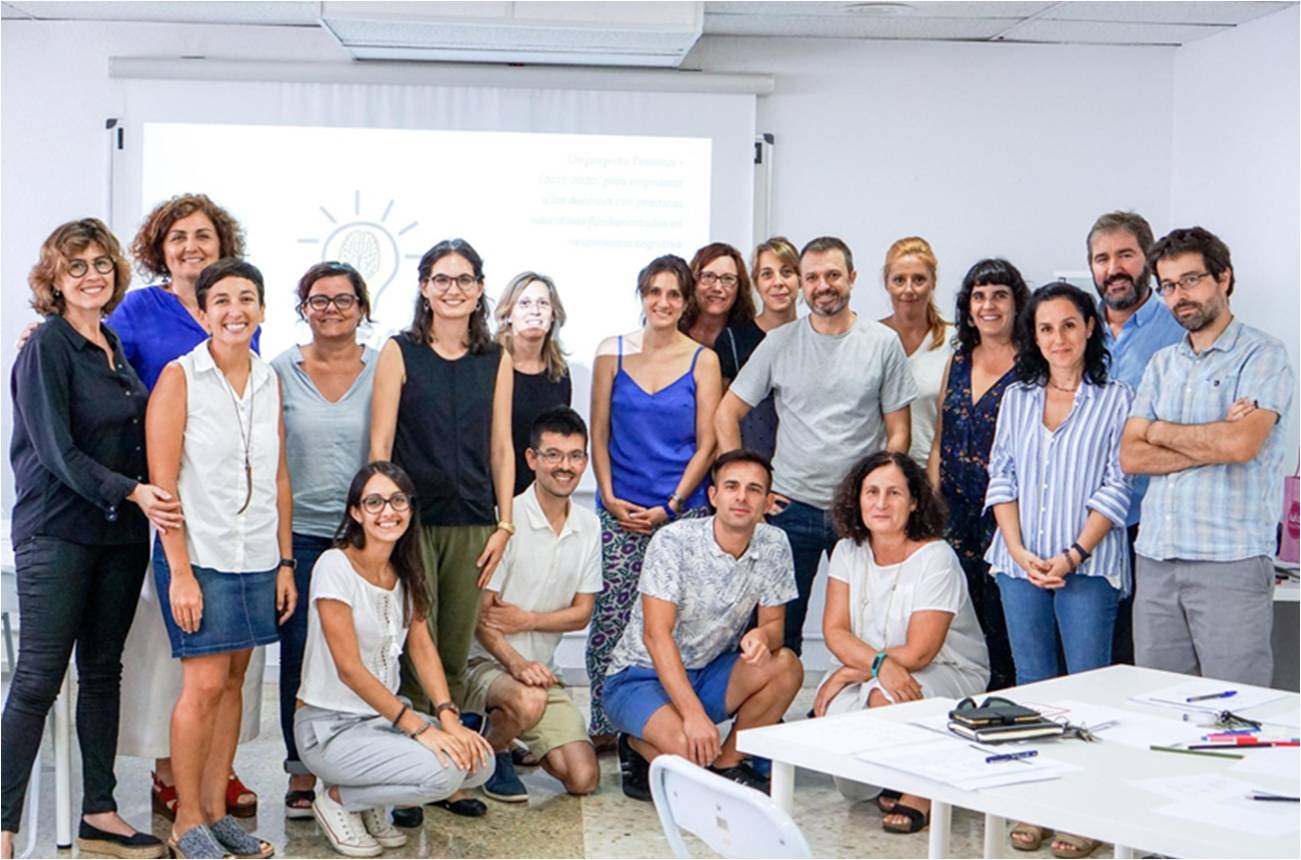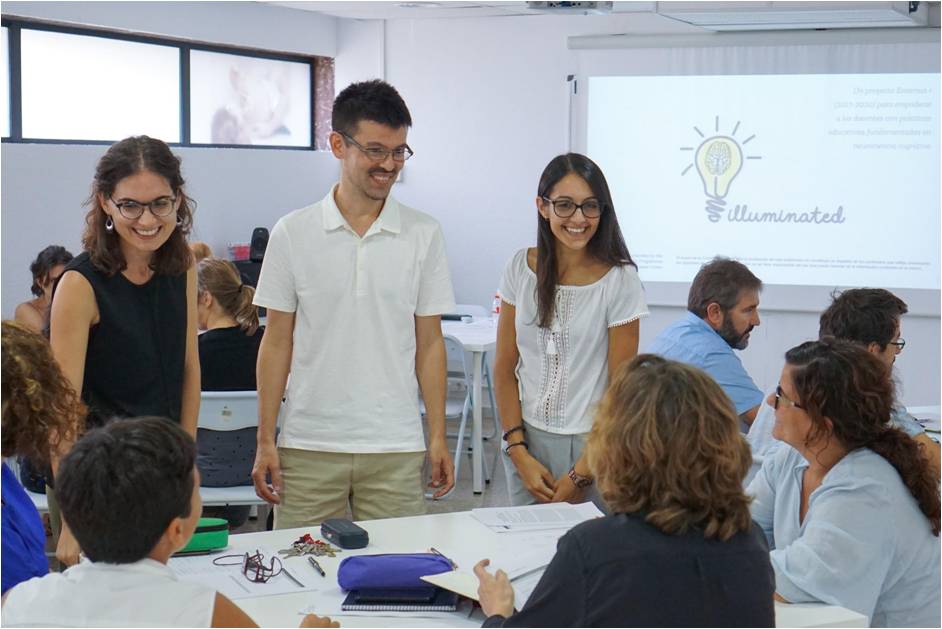Improving education through neuroscience. Three Catalan centres of education are taking part in a pioneering pilot project
Improving education through neuroscience. Three Catalan centres of education are taking part in a pioneering pilot project
Improving education through neuroscience. Three Catalan centres of education are taking part in a pioneering pilot project
In the framework of the European project Illuminated, coordinated by Davinia Hernández-Leo and Marc Beardsley, Institut Juan Manuel Zafra (Barcelona), Centre d’Estudis Dolmen (L’Hospitalet de Llobregat) and Ginebró (Llinars del Vallès) have begun to participate in the pilot programme to improve educational practices based on neuroscience.

Several studies have suggested that teachers often have misconceptions about how students learn and that many teachers have not received enough training on the science of learning, despite the major advances made in the field of neuroscience. For example, a report in 2016 that analyses teachers’ teaching programmes concluded that teachers do not acquire (in text books or at work or in training) enough basic knowledge about cognitive strategies that may them help to ensure children’s learning. It therefore follows that teachers and their practices could be better supported through formal training in this discipline.
“In view of artificial intelligence, it is essential for us to understand how better to use the potential of our brains”
This was the starting point of a project funded by the EU’s ERASMUS+ programme: the Illuminated project which is coordinated by the Department of Information and Communication Technologies (DTIC) at Pompeu Fabra University in collaboration with European partners, including neuroscientists at Cicero Learning at the University of Helsinki (Finland). The project develops training in the form of workshops and an online course aimed at school teachers.
Marc Beardsley, a member of the research group on Interactive and Distributed Technologies for Education (TIDE) at UPF, manager and co-leader of the Illuminated project comments: “the challenge is to translate what is understood about human learning from neuroscience into a format that is easily applicable by teachers in their regular teaching practices”.
“To be able to collaborate with teachers and experts in neuroscience directly, as in the Illuminated project, is hugely important”
UPF’s TIDE, with the support of the RecerCaixa and Maria de Maetzu programmes, is leading the research surrounding the European Illuminated project with the goal of better understanding the needs of school teachers and evaluating the approaches, both with and without technology, to give support to educators in the design of students’ learning. Davinia Hernández-Leo, project coordinator and head of TIDE, says: ”Our goal is to contribute to improving education. To be able to collaborate with teachers and experts in neuroscience directly, as in the Illuminated project, is hugely important”.
Initial pilot experiences in Catalonia with a view to being introduced in Europe
In the framework of the European project Illuminated, coordinated by Davinia Hernández-Leo and Marc Bearsleay, Institut Juan Manuel Zafra(Barcelona), Centre d’Estudis Dolmen (L’Hospitalet de Llobregat) and Ginebró (Llinars del Vallès), have begun to participate in the pilot programme to improve educational practices based on neuroscience.
On 28 June, 46 teachers from Institut Juan Manuel Zafra (Barcelona) participated in the first workshop on the science of learning. Carles Sierra, head teacher of Institut Juan Manuel Zafra, states “in view of artificial intelligence, it is essential for us to understand how better to use the potential of our brains”. The workshop introduced key concepts on how students learn, the role of memory in learning and the biological limits of our systems of learning and memory. The workshop also made use of teaching strategies aligned with the science of learning offering participants an opportunity to experience the strategies from the student’s perspective.
Our memory is underlying in our conscious thoughts and actions. The memory is not only activated when we need to remember something, it is always active and it is essential for learning
“Through Neuroeducation we have recovered the memory as a learning tool”, reminds Dolores Morcillo, a teacher at Ginebró, referring to one of the key messages of the workshops. The message, far from extolling mere memorization, means it is better to convey the idea that our memory system is underlying in our conscious thoughts and actions. The memory is not only activated when we need to remember something, it is always active and it is essential for learning.
At the beginning of this September, Centre d’Estudis Dolmen (L’Hospitalet de Llobregat) and Taller Ginebró (Llinars del Vallès) participated in the first workshop, and all the schools participated in a second workshop that introduced evidence-based teaching strategies, strategies that do not require special technology, extensive training or significant preparation time in order to be implemented.
“The Illuminated project workshops are closely aligned with key educational goals, as they help to give our students the tools to better understand how they learn and think and what is the basis on which to prepare them for a successful future”
Ana Nada, a teacher at CE Dolmen, says that “the workshop has made us understand how memory and learning processes take place, as well as the elements that enhance or hinder them. This allows us to improve the design of our classes”, and Magali Pollac, a teacher at Institut Juan Manuel Zafra (Barcelona) said of the workshops: “Neuroscience is important to provide evidence on important factors in the learning process that may be intuitively applied but it is essential to take them into account consciously to ensure that students acquire meaningful, lasting learning. For example, two important points that they have acquired from the workshops that they take at the Institut are the concept of the illusions of competence and the importance of repetition in the long term”.
The Illuminated project began in December 2017 and will continue until June 2020. It organizes workshops targeting school teachers on the science of learning in Barcelona, Helsinki (Finland), Porto (Portugal) and Florina (Greece). In addition to the workshops, the project will offer a massive open online course (MOOC) for educators in 2020, and will prepare a toolkit to support them in the implementation of educational workshops at local level.
In this way, the initial pilot experiences with the three schools of Catalonia are a collaborative effort to improve the workshops to enhance their usefulness for educators in Europe. Carles Serra, head teacher at Institut Juan Manuel Zafra, affirmed that “The Illuminated project workshops are closely aligned with key educational goals, as they help to give our students the tools to better understand how they learn and think and what is the basis on which to prepare them for a successful future”.

